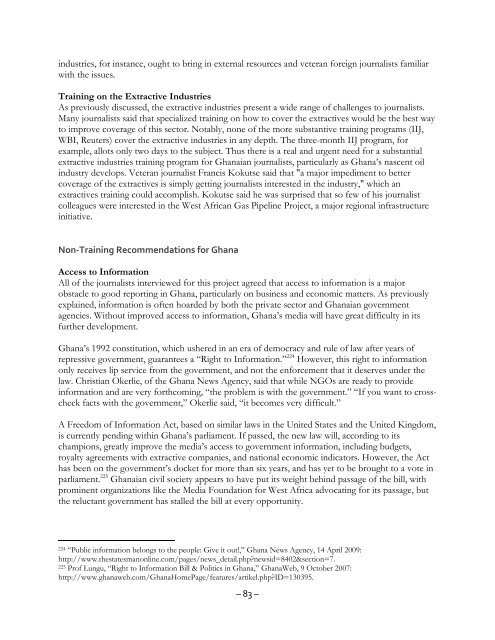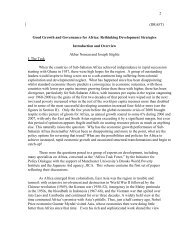THERE WILL BE INK - Initiative for Policy Dialogue
THERE WILL BE INK - Initiative for Policy Dialogue
THERE WILL BE INK - Initiative for Policy Dialogue
You also want an ePaper? Increase the reach of your titles
YUMPU automatically turns print PDFs into web optimized ePapers that Google loves.
industries, <strong>for</strong> instance, ought to bring in external resources and veteran <strong>for</strong>eign journalists familiarwith the issues.Training on the Extractive IndustriesAs previously discussed, the extractive industries present a wide range of challenges to journalists.Many journalists said that specialized training on how to cover the extractives would be the best wayto improve coverage of this sector. Notably, none of the more substantive training programs (IIJ,WBI, Reuters) cover the extractive industries in any depth. The three-month IIJ program, <strong>for</strong>example, allots only two days to the subject. Thus there is a real and urgent need <strong>for</strong> a substantialextractive industries training program <strong>for</strong> Ghanaian journalists, particularly as Ghana’s nascent oilindustry develops. Veteran journalist Francis Kokutse said that "a major impediment to bettercoverage of the extractives is simply getting journalists interested in the industry," which anextractives training could accomplish. Kokutse said he was surprised that so few of his journalistcolleagues were interested in the West African Gas Pipeline Project, a major regional infrastructureinitiative.Non-Training Recommendations <strong>for</strong> GhanaAccess to In<strong>for</strong>mationAll of the journalists interviewed <strong>for</strong> this project agreed that access to in<strong>for</strong>mation is a majorobstacle to good reporting in Ghana, particularly on business and economic matters. As previouslyexplained, in<strong>for</strong>mation is often hoarded by both the private sector and Ghanaian governmentagencies. Without improved access to in<strong>for</strong>mation, Ghana’s media will have great difficulty in itsfurther development.Ghana’s 1992 constitution, which ushered in an era of democracy and rule of law after years ofrepressive government, guarantees a “Right to In<strong>for</strong>mation.” 224 However, this right to in<strong>for</strong>mationonly receives lip service from the government, and not the en<strong>for</strong>cement that it deserves under thelaw. Christian Okerlie, of the Ghana News Agency, said that while NGOs are ready to providein<strong>for</strong>mation and are very <strong>for</strong>thcoming, “the problem is with the government.” “If you want to crosscheckfacts with the government,” Okerlie said, “it becomes very difficult.”A Freedom of In<strong>for</strong>mation Act, based on similar laws in the United States and the United Kingdom,is currently pending within Ghana’s parliament. If passed, the new law will, according to itschampions, greatly improve the media’s access to government in<strong>for</strong>mation, including budgets,royalty agreements with extractive companies, and national economic indicators. However, the Acthas been on the government’s docket <strong>for</strong> more than six years, and has yet to be brought to a vote inparliament. 225 Ghanaian civil society appears to have put its weight behind passage of the bill, withprominent organizations like the Media Foundation <strong>for</strong> West Africa advocating <strong>for</strong> its passage, butthe reluctant government has stalled the bill at every opportunity.224 “Public in<strong>for</strong>mation belongs to the people: Give it out!,” Ghana News Agency, 14 April 2009:http://www.thestatesmanonline.com/pages/news_detail.php?newsid=8402§ion=7.225 Prof Lungu, “Right to In<strong>for</strong>mation Bill & Politics in Ghana,” GhanaWeb, 9 October 2007:http://www.ghanaweb.com/GhanaHomePage/features/artikel.php?ID=130395.– 83 –














